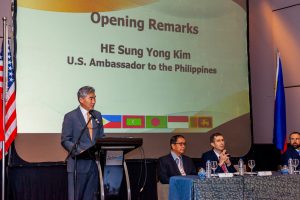Last week, the United States held a regional counterterrorism expert meeting. The engagement highlighted one component of the broader U.S. approach to addressing terrorism and violent extremism in Southeast Asia.
As I have observed previously, the United States has played an important role in terms of the terrorism challenges that Southeast Asia faces, with more recent examples including the post-9/11 “war on terror” period in the 2000s as well as the struggle against the Islamic State and other related groups, most clearly manifested in the region with the 2017 siege by Islamic State-linked militants in Marawi city in the Philippines.
While the headlines often tend to be on more security-centric aspects of the U.S. role in counterterrorism, Washington’s role is in fact evident in a range of ways, including boosting training and equipment for law enforcement agencies, organizing courses covering areas such as investigations and prosecution, and designing programs designed to address the root causes of terrorism and violent extremism.
Last week, the U.S. counterterrorism role in Southeast Asia was in the headlines again with the holding of a regional conference. Washington hosted a conference on regional cooperation in investigating and prosecuting terrorism that occurred in the Philippines.
The conference, called the Southeast Asia Regional Experts Exchange (SEAREE), was hosted by the U.S. Embassy in the Philippines Department of Justice Office of Prosecutorial Development, Assistance, and Training in Cebu City from January 28 to 30.
According to a statement by the U.S. Embassy in the Philippines, SEAREE was attended by 34 prosecutors and investigators from the Philippines, Indonesia, Sri Lanka, the Maldives, Bangladesh, and the United States including experts from the Federal Bureau of Investigation and the Department of Justice
A range of subjects were discussed at the conference, including the use of digital forensics in terrorism cases and social media’s role in terrorism financing. Framing the significance of the engagement, both U.S. Ambassador to the Philippines Sung Kim, who himself was a former prosecutor, and Philippine Prosecutor General Benedicto Malcontento, noted in their remarks at the conference the importance of collaboration in areas such as stopping terrorist travel, social media activities, and financing, as well as embracing new investigative tools and building networks across national borders.
To be sure, SEAREE is just one among many instances of U.S. collaboration with respect to counterterrorism in Southeast Asia, and few additional details have been made publicly available at the private deliberations at the conference itself. Nonetheless, such developments will continue to be important to monitor and assess in order to evaluate Washington’s wider role in counterterrorism in the region.

































